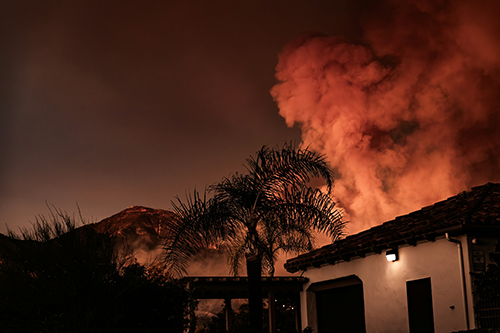(Posted 2025 April)
 Natural disasters do not cause domestic or sexual violence, but the physical, mental, and socioeconomic effects of disaster can escalate interpersonal violence.
Natural disasters do not cause domestic or sexual violence, but the physical, mental, and socioeconomic effects of disaster can escalate interpersonal violence.
Increased reports of domestic and sexual violence after a natural disaster show this escalation:
- In 2017, domestic violence service providers saw a 62 percent increase in requests for survivor-related services and a 47 percent surge in requests for violence prevention and education resources in Puerto Rico in the aftermath of Hurricane Maria.
- There was a jump from nearly 34 percent to more than 45 percent victimization rate for women and an increase from 37 percent to 43 percent for men after Hurricane Katrina in 2005. Calls to the National Domestic Violence Hotline from Gulf Coast states increased 13 percent to 21 percent in Louisiana alone.
- Almost one-third of sexual assaults reported during 2005’s Hurricane Rita happened at evacuation shelters.
- It’s too early to assess reports from the 2025 Los Angeles wildfires, in which 40,000 acres were burnt, 16,000 structures were destroyed, and at least 29 people lost their lives, but experts say to expect over the coming months to see a rise in grief; depression; frustration; anger; a desire to blame others; despair; dissolved marriages; self-medication; and inappropriate coping mechanisms, including aggressive acts and domestic violence.
Several factors help natural disasters contribute to the incidence of interpersonal violence:
- Stress and trauma: Disasters often lead to significant psychological stress and trauma. The loss of loved ones, homes, and livelihoods can exacerbate feelings of helplessness, desperation, and frustration. These heightened emotional states can exacerbate pre-existing mental health conditions and contribute to new ones. This can increase conflicts and lead to aggressive, violent behavior in some people.
- Resource scarcity: Natural disasters frequently result in shortages of basic necessities, including food, water, shelter, child care, and medical supplies. A lack of these resources can lead to competition among survivors, which can escalate into interpersonal violence.
- Money woes: Disasters often lead to economic instability, including job losses and financial insecurity. This stressor is a well-known risk factor for interpersonal violence, including domestic violence, as individuals struggle to cope with financial pressures.
- Social disruption: The social fabric of communities can be disrupted or destroyed by natural disasters. Displacement, loss of social networks, and breakdown of community structures weaken the social bonds that typically help regulate behavior and support non-violent conflict resolution.
- Gender inequalities: Women and children are often more vulnerable to interpersonal violence following natural disasters, exacerbating existing gender inequalities and putting women and children at higher risk of domestic violence, sexual abuse, and exploitation.
- Displacement: Natural disasters can force large numbers of people to migrate or live in temporary shelters or camps. Overcrowded and insecure living conditions can foster environments where interpersonal violence is more likely, both within and between displaced populations and host communities.
- Breakdown of law and order: Mass emergencies can strain law enforcement and judicial systems, reducing their ability to maintain order and protect citizens. The breakdown of these systems during and after a disaster can lead to increased criminal activities, including violence.
Victims aren’t the only ones impacted by the effects of a natural disaster. Staff of violence prevention programs may face the same physical needs as the people they serve. They may also need housing, transportation, adjustment of insurance claims, and community outreach. Organizational infrastructure may also be damaged, limiting their ability to perform services for survivors. And staff may experience burnout following a community disaster.
This fusion of emotional, economic, and social stressors in the wake of natural disasters creates conditions that can encourage interpersonal violence. Addressing these multifaceted issues requires coordinated efforts in disaster response and recovery, including mental health support, resource allocation, and the reinforcement of social and legal protections.
If you or someone you know is experiencing interpersonal violence, call the Domestic and Sexual Violence 24-Hour Hotline at 703-360-7273 for resources and support. If you are in immediate danger, call 9-1-1.
This posting is part of the Department of Family Services' Community Corner where you’ll find timely information about upcoming events, parenting and wellness tips, programs and services, and more! Share these helpful posts with your friends and family. Don't miss out on future postings! Sign up today!

